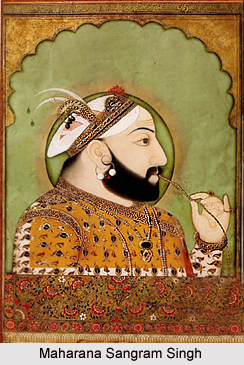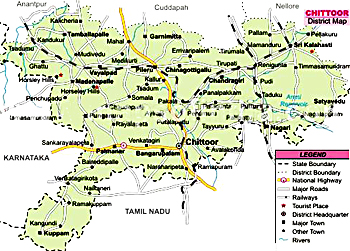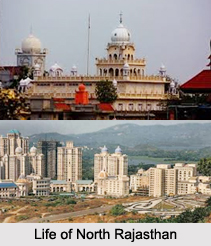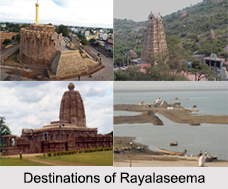Maharana Sangram Singh, popularly known as Rana Sanga, ruled Mewar from 1509 and 1527. He was born on April 12, 1484 and was a scion of the Sisodia clan of Suryavanshi Rajputs. He was born to Raimal, the ruler of Mewar and had two brothers Prithviraj and Jaimal. The young brothers were very close to each other and often went to a mountain cave near Mewar. One day an astrologer witch in the cave told the brothers that Rana Sanga would become the next king of Mewar and on hearing this, the other two brothers became jealous. Since then the brothers started to share a bitter relationship, causing much grief to their father.
 Maharana Sangram Singh was banished after having a bad quarrel with his brothers and he spent this period working as a shepherd in a remote village in the Aravalli hills. Soon, he married the daughter of the village`s chief.
Maharana Sangram Singh was banished after having a bad quarrel with his brothers and he spent this period working as a shepherd in a remote village in the Aravalli hills. Soon, he married the daughter of the village`s chief.
Meanwhile, both the brothers of Maharana Sangram Singh died fighting violently for the throne. After their deaths, Maharana Sangram Singh returned to his father`s court in order to support his parents in their mourning and to protect his patrimony. He succeeded his father as ruler of Mewar upon the death of Raimal in 1509.the reign of Maharana Sangram Singh was manifested by a series of repetitive battles. He entered into eighteen battles with Muslim forces, fighting the forces of the rulers of Delhi, Gujarat and Malwa on various occasions. During these battles, he sustained eighty-four wounds on his body. He lost one arm and got crippled in one leg. Despite all this, Maharana Sangram Singh was fair in victory and in 1519, after Sultan Mahmud of Mandu was overpowered and taken as a prisoner, Maharana Sangram Singh extended conventional gallantry and compassion to him. Sultan Mahmud was treated like a guest and the Maharana Sangram Singh restored his kingdom to him.
Maharana Sangram Singh was involved in several battles in his lifetime. Battle of Khanwa on March 17 was launched by Maharana Sangram Singh as a furious attack on the centre and right wing of the Mughal force; the clash lasted for several hours. Mughal artillery wreaked mayhem in the Rajputs closed boundaries. Their cannon fire caused the elephants in the Rajput army to flee thus causing stampede. It is said that the Rajputs went ahead and showed great heroism by stuffing themselves in the mouth of the cannons to stop the throw. However, the Rajputs failed to overrun the strongly protected central "fortress" of the Mughal army. Maharana Sangram Singh who was an expert in Spear Warfare flinged his spear on Babur, which missed Babur`s head by an inch, thus changing the fortune of India.
Maharana Sangram Singh sustained more wounds, at one time being stacked by an arrow; nevertheless, he fought on. For a while, the battle`s result was not decided, then it was understood that Maharana Sangram Singh`s ship was sinking. Soon, Silhadi decamped to Babur with his entire force. After ten hours, the association broke. It was all over for Mewar. The defection of a major portion of the army deadly weakened the Rajputs. Mughal troops finally rolled back the Rajputs flanks. The Rajput army fell apart rapidly and Maharana Sangram Singh chose to retreat from the battle, to live and fight another day. Babur had declared this war as Jihad against the disloyal.
The responsibility of Rana Kumbha passed onto Maharana Sangram Singh. Slowly, he brought Mewar to the peak of its prosperity and prominence, establishing it as the foremost Rajput state. After the power in Delhi collapsed, Maharana Sangram Singh was emerged as the most powerful Hindu King in North India with a direct or indirect control over the whole of Rajputana. His battles against the Lodhis and the Muslim rulers of Gujarat and Malwa are still known as legends. Maharana Sangram Singh united the Rajput states and put up a strong unified defence against the Mughal armies.
Maharana Sangram Singh is the apt name of a Kshatriya King who was the Suryavanshi King focussing on consolidating and developing his state. The loyalty of Maharana Sangram Singh to the Rajput code of chivalry and generosity is thought to be a rare trait in Indian rulers.
Maharana Sangram Singh thus brought Mewar to the heights of success and governed a large part of Rajputana. More importantly, he succeeded in uniting several Rajput states and motivating them to make a united bid for control of northern India. This is Maharana Sangram Singh `s continuing claim to fame, and the battle of Khanwa was the seminal event that became an eminent event in the history of north India.



















